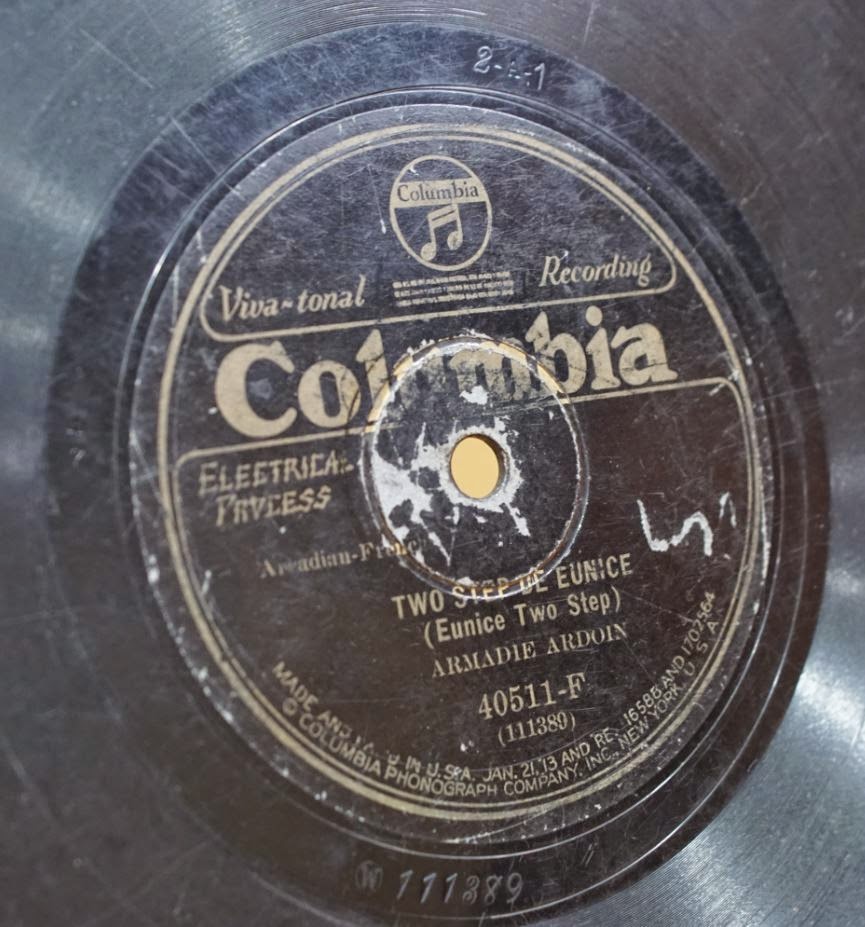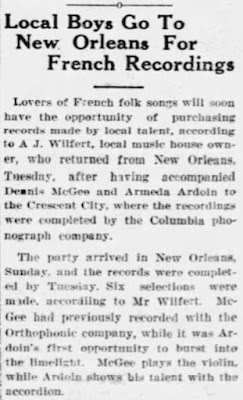Better known as "Chere Tout Tout", it has become one of the most covered tunes in all of Cajun music. J. B. Fuselier would be the first to record the song, which he wrote for his daughter, Myrtle. The melody however seems to be much older and appears in a few songs. It's extremely close to a melody recorded in 1929 by Angelas Lejeune with Dennis McGee and Ernest Fruge for Brunswick called "La Valse de Church Point" in New Orleans. A few days later, McGee and Fruge used it again during his Vocalion recording session called "Valse de Puit d'Huile". In addition, it has a loose similarity to Columbus Fruge's "Pleure Plus" recorded in Memphis, TN in 1929. It is spelled in a variety of ways such as "Chere Toutou", "Chere Te Te" and "Chere Tout Toute". In 1937, Beethoven Miller, along with Fuselier, would travel to New Orleans and record the song for Bluebird (#2012).

J.B. joined Beethoven Miller's band as the fiddle player and vocalist, along with Preston Manuel on guitar. Later, one of the best-known lineups of the Merrymakers consisted of J.B. on fiddle, Desbra Fontenot on steel, Norris Courville on drums, and Preston Manuel on guitar. Crawford Vincent, who sometimes sat in on the drums after J.B. moved to Lake Charles, Louisiana, noted that J.B. was a smooth fiddler, especially on "Chere Tout Tout".
Ma tout-toute, viens me chercher, tu es si loin,
Je connais pas ayou toi t'es, chères joues roses
Que moi j'aime un tas, chère, mais de tout mon coeur.
Ma Tout-toute, viens me rejoindre, chère,
Je connais pas ayou toi t'es, malheureuse.
 |
| Myrtle "Tout Tout" Berglund |
Preston Manuel remembers the song:
We made "Chere Tout Tout". We were the ones who made that for the first time; that was for his little daughter who had been given the nickname "tout-tout".The title has the same endearment as other Cajun french phrases such as "tit monde" or "mon coeur" which loosely translates to "you're my all-in all". "Chère" is shortened form of the French word "cherie". The common Cajun phrase "ayou" is a corrupted form of the phrase "où est" which loosely translates to "where are" or "where at". Raymond Francois notes that this is often the opening song played by a Cajun band because it is so familiar as to be effortless and therefore confidence-building, and that it helps to make sure the instruments are tuned properly.
My all-in all, come get me, you're so far
I do not know where you are, dear rosy cheeks
I like you a lot, dear, with all my heart.
My all-in all, come back to me, dear,
I don't know where you are, I'm heartbroken.
By 1939, the Alley Boys of Abbeville re-recorded the tune and called it "Apres Jengler a Toi". Over the years, J.B. played with many other musicians including Nathan Abshire, Will Kegley, Shelton Manuel, Ellias Soileau and Jimmy Baker. It wouldn't be until the 1960s when Joe Bonsall would record the tune, this time with the accordion, making it one of the most popular tunes in the genre. According to musician Chris Miller, Wayne Toups did a version of the song with Pat Savant with two accordions playing at the same time for Kajun records.
- Interview Preston Manuel by Raymond Francois
- Louisiana Fiddlers By Ron Yule
- http://library.mcneese.edu/depts/archive/SWLAMusicians/encycloaj.htm
- http://www.pbs.org/speak/seatosea/americanvarieties/cajun/
Find:
Cajun String Bands 1930's: Cajun Breakdown (Arhoolie, 1997)
Cajun String Bands 1930's: Cajun Breakdown (Arhoolie, 1997)
Cajun Capers: Cajun Music 1928-1954 (Proper, 2005)
The Best Of Cajun & Zydeco (Not Now, 2010)
The Best Of Cajun & Zydeco (Not Now, 2010)



















